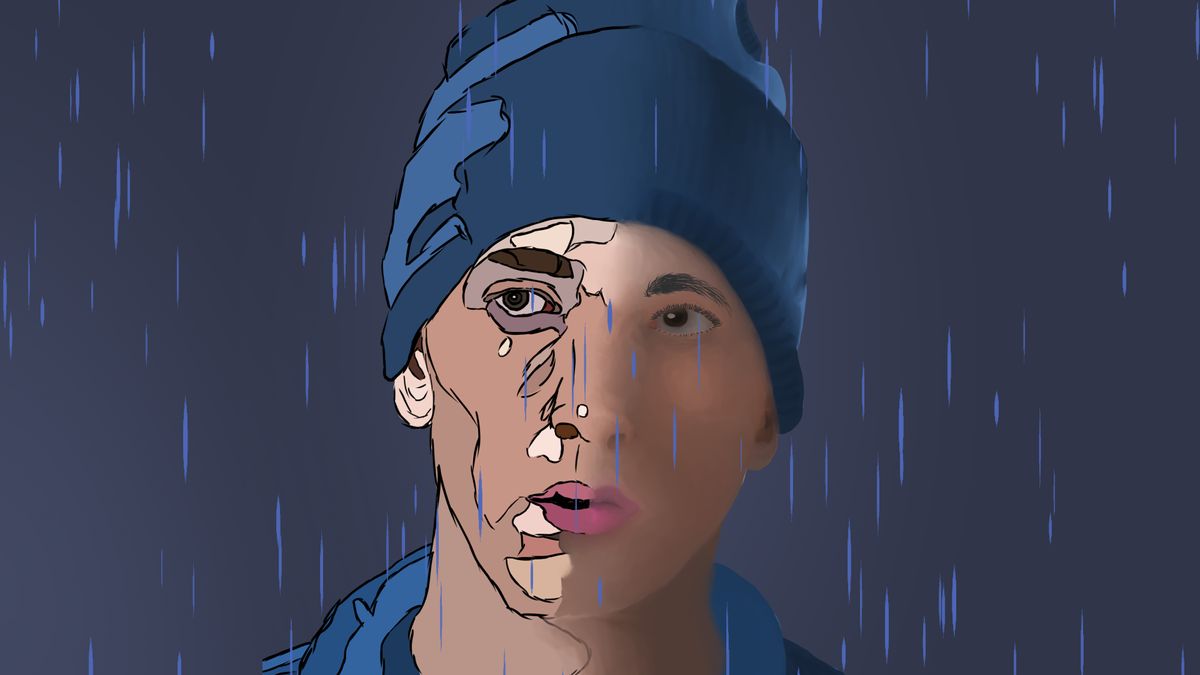Hip-hop has long been a medium for artists to express their deepest emotions and tell their most personal stories. ‘Forgot About Dre’ is a song that resonates with many because of its raw portrayal of overcoming adversity and breaking free from the past. In this article, we delve into the lyrics of ‘Forgot About Dre’ and other hip-hop songs that tackle themes of family feuds, absent fathers, parental neglect, and the quest for redemption through music. We explore how these artists use their craft to confront their demons, heal old wounds, and ultimately, transform pain into powerful narratives.
Key Takeaways
- Eminem’s ‘Cleanin’ Out My Closet’ and ‘My Mom’ provide a stark look into his troubled relationship with his mother, highlighting the impact of parental substance abuse and negligence.
- Songs like 2Pac’s ‘Papa’z Song’ and Good Charlotte’s ‘The Story of My Old Man’ reflect the emotional struggles faced by children growing up with absent fathers.
- Tracks such as ‘Because of You’ by Kelly Clarkson convey the lasting emotional scars of parental neglect, yet also offer a message of hope and resilience.
- The theme of redemption is central in ‘Forgot About Dre’, where overcoming past pain and breaking free from negative cycles is a focus for personal growth.
- Music serves as a cathartic outlet for artists to process their family conflicts, with some, like Eminem, eventually reaching a place of apology and forgiveness.
The Raw Truth in Rhymes: Eminem’s Family Feuds

The Harsh Narrative of ‘Cleanin’ Out My Closet’
Eminem’s Cleanin’ Out My Closet is more than just a song; it’s a confessional booth set to a beat. The track is a stark exploration of bad parenting, laying bare the emotional scars left by a turbulent childhood. Eminem doesn’t hold back as he recounts the neglect and substance abuse that colored his upbringing, painting a vivid picture of the pain inflicted by his mother’s actions.
- The song delves into the darkest corners of Eminem’s psyche.
- It’s a narrative that’s both graphic and disturbing, yet undeniably compelling.
- Eminem’s public bashing of his mother made the song controversial.
Despite the rawness of the lyrics, Eminem has since found a path to forgiveness, no longer performing the song as a sign of his evolved perspective. This evolution speaks to the power of music as a medium for healing and change, a theme that resonates throughout the genre of hip-hop.
Confronting Maternal Issues in ‘My Mom’
Eminem’s track ‘My Mom’ serves as a stark confessional, painting a vivid picture of his childhood marred by his mother’s prescription drug dependency. The song’s narrative is unflinching, exposing the raw underbelly of a home where maternal care is eclipsed by substance abuse.
- The lyrics are a candid exploration of the impact of his mother’s actions on his upbringing.
- Eminem uses his music to shine a light on the broader issue of parental negligence.
- The song is a poignant reminder of the long-lasting effects of a troubled parent-child relationship.
Eminem’s storytelling in ‘My Mom’ is a powerful testament to the resilience of those who grow up in the shadow of addiction. It’s a narrative that resonates with many, highlighting the emotional toll such experiences can take.
While the song may come across as harsh, it’s a reflection of the reality faced by many children in similar situations. Eminem’s ability to articulate this pain through his rhymes offers a form of catharsis, not just for himself, but for listeners who find their own stories echoed in his words.
Eminem’s Apology and Artistic Evolution
Eminem’s journey through music has been as tumultuous as it has been transformative. From the raw anger in Cleanin’ Out My Closet to the mature reflection in ‘Headlights’, we see a clear arc of personal growth. His early work often featured scathing lyrics about his family, particularly his mother, which resonated with many fans who shared similar experiences.
- The track ‘Cleanin’ Out My Closet’ was a stark exploration of his difficult childhood.
- ‘My Mom’ delved into the impact of his mother’s prescription drug abuse.
- Eminem has since expressed regret for these songs and no longer performs ‘Cleanin’ Out My Closet’.
Eminem’s evolution is not just a personal journey but a broader reflection of the power of music to encapsulate change. His apology to his mother in ‘Headlights’ is a testament to his growth, both as an artist and as a person.
This evolution has been met with both praise and criticism, but it undeniably showcases Eminem’s ability to confront his past and use his music as a means for healing. His willingness to publicly acknowledge his mistakes and seek redemption is a powerful message of hope for anyone struggling with the ghosts of their past.
Absent Fathers in Hip-Hop: A Recurring Theme

2Pac’s ‘Papa’z Song’: A Child’s Perspective on Abandonment
In the raw verses of 2Pac’s ‘Papa’z Song’, we dive into the heart-wrenching narrative of a young boy grappling with the absence of his father. The song, hailing from the 1993 album ‘Strictly 4 My N.I.G.G.A.Z…’, lays bare the emotions of a child who had to "play catch by [him]self"—a poignant metaphor for the solo journey he’s been forced to embark on.
The lyrics don’t just echo the void left by a father’s departure; they resonate with the confusion and anger that fester in the wake of abandonment.
Yet, amidst the turmoil, there’s a glimmer of resolution. The boy, now reflecting as a man, acknowledges the stepdad who stepped up, the one who "took him from a boy to a man." This transition from resentment to recognition marks a powerful moment in the song.
- The father’s absence is felt through the child’s unanswered questions.
- Anger and longing intertwine, painting a complex emotional landscape.
- Ultimately, the narrative shifts towards the appreciation of a father figure who was present.
The song serves as a stark reminder that while conflicts are normal in family dynamics, the presence of a mentor and balanced discipline can pave the way for a healthier relationship.
The Temptations’ Take on a Wandering Dad in ‘Papa Was a Rolling Stone’
The Temptations’ hit ‘Papa Was a Rolling Stone’ delves into the narrative of a father who chooses a nomadic life over his familial duties. The song’s groove is undeniably catchy, but it’s the poignant lyrics that tell the real story. They paint a picture of a man who was never there, a figure more myth than father, leaving his children grappling with the fallout of his absence.
- The father is depicted as a man who couldn’t resist the lure of the road, the so-called ‘rolling stone’.
- His departure leaves a void filled with questions and a longing for what could have been.
- The children are left to reckon with the legacy of a man they barely knew, yet whose actions shaped their lives.
The song resonates with many because it addresses feelings of longing, confusion, and the desire for answers. It’s a testament to the power of music to evoke empathy and understanding, acknowledging the complexities of such a deeply personal struggle.
Good Charlotte’s ‘The Story of My Old Man’ and the Search for a Father Figure
Good Charlotte’s punk rock anthem, The Story of My Old Man, hits hard with its raw depiction of an absent father. The song, dropping truth bombs in every verse, isn’t just about the absence—it’s about the aftermath, the emotional baggage that gets lugged around long after dad’s left the building.
- The lyrics are a gut punch, detailing addiction struggles and a lack of support.
- It’s a narrative that resonates with many, highlighting the long shadow cast by bad parenting.
- The song becomes a voice for those who’ve felt the sting of a father’s neglect.
The echoes of an absent father linger long in the mind, shaping futures with the weight of the past.
In the end, Good Charlotte doesn’t just share a story; they start a conversation about the need for healing and the search for a father figure that many undertake. It’s a punk rock journey from pain to empowerment, one chord at a time.
The Impact of Neglect: From Lyrics to Reality

Eminem’s Reflection on Parental Negligence
Eminem’s music often serves as a raw, unfiltered window into the complexities of his upbringing. In tracks like "My Mom" and "Cleanin’ Out My Closet," he doesn’t shy away from exposing the darker aspects of his childhood, particularly focusing on his mother’s substance abuse and the emotional fallout that ensued.
- Through his lyrics, Eminem portrays the stark reality of growing up with a parent battling addiction.
- He illustrates the neglect he felt, painting a picture of a childhood marred by absence and instability.
- The impact of these experiences is conveyed with brutal honesty, leaving listeners with a vivid understanding of his emotional scars.
Eminem’s storytelling is not just a cathartic release but also a mirror reflecting the struggles of many who have felt the sting of parental neglect.
His music has evolved over time, and with it, his perspective on his past. While earlier songs were charged with anger and resentment, his more recent work shows signs of understanding and, perhaps, forgiveness. This evolution underscores the power of writing and music as tools for healing and personal growth.
The Emotional Toll of Absence in ‘Because of You’
Kelly Clarkson’s Because of You paints a vivid picture of the emotional baggage that comes with parental neglect. The lyrics are a raw and honest portrayal of how a child, now an adult, navigates life’s complexities due to the instability of their childhood. The line, "Because of you, I am afraid," hits home, encapsulating the profound impact an unstable upbringing can have.
- The song is a plea for parents to recognize the psychological impact of their actions.
- It’s a reminder that decisions made in haste can leave indelible marks on young minds.
- Yet, it also speaks to the resilience and strength that can emerge from such adversity.
Despite the somber themes, there’s an undercurrent of hope and empowerment. It’s a testament to the human spirit’s ability to overcome and find healing, even when faced with the deepest of scars.
Finding Hope in the Midst of Parental Neglect
In the shadows of neglect, music often shines a light on the darkest of themes, yet it also offers a glimmer of hope. Artists weave tales of resilience, painting pictures of a future unchained from the past.
- The metaphor of a river in Elijah James’ song symbolizes the fleeting presence of parents, yet it culminates in a powerful resolution: the narrator, now a parent himself, is determined to break the cycle.
- Kelly Clarkson’s ‘Because of You’ and Pink’s ‘Mother’ tell stories of overcoming adversity, finding solace in faith, or the love of someone who steps in to fill the void.
In the end, it’s about rewriting your own story, not as a tale of sorrow, but as one of triumph and unwavering commitment to do better.
The journey through music can be a cathartic one, offering a space to process, to grieve, and ultimately, to find a path forward. It’s a reminder that from the depths of hardship can emerge the strongest of wills to create a new narrative, one where the cycle of neglect is not just acknowledged but actively countered with love and presence.
The Cycle of Pain and Redemption in Song

Breaking Free from the Past in ‘Forgot About Dre’
Dr. Dre’s ‘Forgot About Dre’ is a powerful anthem of resilience and defiance. It’s a track that doesn’t just resonate with the streets but also speaks to anyone looking to break free from the shadows of their past. The song is a declaration of independence, a reminder that no matter how much you’ve been overlooked or underestimated, you can rise above.
- The lyrics convey a sense of rebellion and fearlessness.
- Embracing a reputation for defying expectations.
- A narrative that encourages listeners to forge their own paths.
In the midst of adversity and doubt, ‘Forgot About Dre’ stands as a testament to the strength of the human spirit to overcome and reclaim one’s identity.
This isn’t just about moving on; it’s about transforming pain into power, using the lessons of the past to fuel a brighter future. The song captures the essence of not letting the past define you, urging listeners to create their own legacy.
The Journey from Resentment to Forgiveness
The path from holding grudges to granting pardon is a complex one, often depicted in the raw verses of hip-hop. It’s a journey that requires one to confront the pain head-on, to understand it, and ultimately, to let it go. This process is not just about forgiving others, but also about forgiving yourself. It’s a crucial step towards healing, and it’s a theme that resonates deeply in the music world.
- Acknowledge the hurt and allow yourself to feel it
- Understand the reasons behind the actions that caused the pain
- Make a conscious decision to forgive, for your own peace of mind
- Work on rebuilding trust, if possible, or finding closure
The road to forgiveness is seldom straight; it’s fraught with emotional potholes and detours. Yet, it’s a road worth traveling for the freedom and lightness it brings to the soul.
Songs often reflect this transformative experience, offering listeners a mirror to their own struggles and a companion along the way. The power of music to guide us through the darkest of times to a place of peace cannot be overstated.
Music as a Medium for Healing and Change
Music isn’t just a backdrop for life’s big moments; it’s a powerful force for transformation. It’s about healing from the inside out, turning pain into power, and using melodies as a ladder to climb out of the darkest places.
- Practicing mindfulness
- Understanding distorted self-image
- Seeking support
These are more than just words; they’re steps on a journey towards a more fulfilling life. And music? It’s the companion that whispers encouragement with every beat.
Music is the silent speaker that echoes our deepest emotions, turning turmoil into triumph without uttering a single word.
Whether it’s the raw energy of a rap verse or the gentle caress of a piano melody, music has the uncanny ability to reflect our struggles and celebrate our victories. It’s a universal language that doesn’t just tell our stories—it helps us rewrite them.
Frequently Asked Questions
What is the main theme of the song ‘Forgot About Dre’?
The main theme of ‘Forgot About Dre’ revolves around Dr. Dre’s return to the music scene and his reminder to critics and fans that he is a pioneer in the rap industry, despite being overlooked during his hiatus. It also touches on themes of perseverance and respect in the face of adversity.
How do Eminem’s personal experiences influence his music?
Eminem’s music is heavily influenced by his personal experiences, including his tumultuous relationship with his mother and absentee father. Songs like ‘Cleanin’ Out My Closet’ and ‘My Mom’ are candid reflections of his difficult childhood and the impact of parental neglect on his life.
What message does 2Pac convey in ‘Papa’z Song’?
In ‘Papa’z Song’, 2Pac conveys the pain and resentment of growing up without a father, expressing feelings of abandonment and the emotional toll it took on him. The song narrates the story from a child’s perspective, emphasizing the impact of a father’s absence.
How is the theme of absent fathers portrayed in hip-hop?
The theme of absent fathers is a recurring motif in hip-hop, often portrayed through personal narratives that describe the emotional and psychological effects of paternal neglect. Artists like 2Pac, Eminem, and Good Charlotte use their lyrics to explore the consequences of fatherlessness and its impact on identity and personal growth.
What does the song ‘Because of You’ by Kelly Clarkson symbolize?
The song ‘Because of You’ by Kelly Clarkson symbolizes the emotional scars and lasting impact of parental neglect. It uses powerful metaphors to convey the feelings of a child who has suffered due to the absence of a parent, while also offering a message of hope and determination to break the cycle of neglect.
How do artists use music to cope with and heal from family feuds?
Artists use music as a therapeutic outlet to express their emotions, cope with family feuds, and work through their personal struggles. Through their lyrics, they can confront painful experiences, seek understanding and forgiveness, and ultimately use their art as a means of healing and personal transformation.
